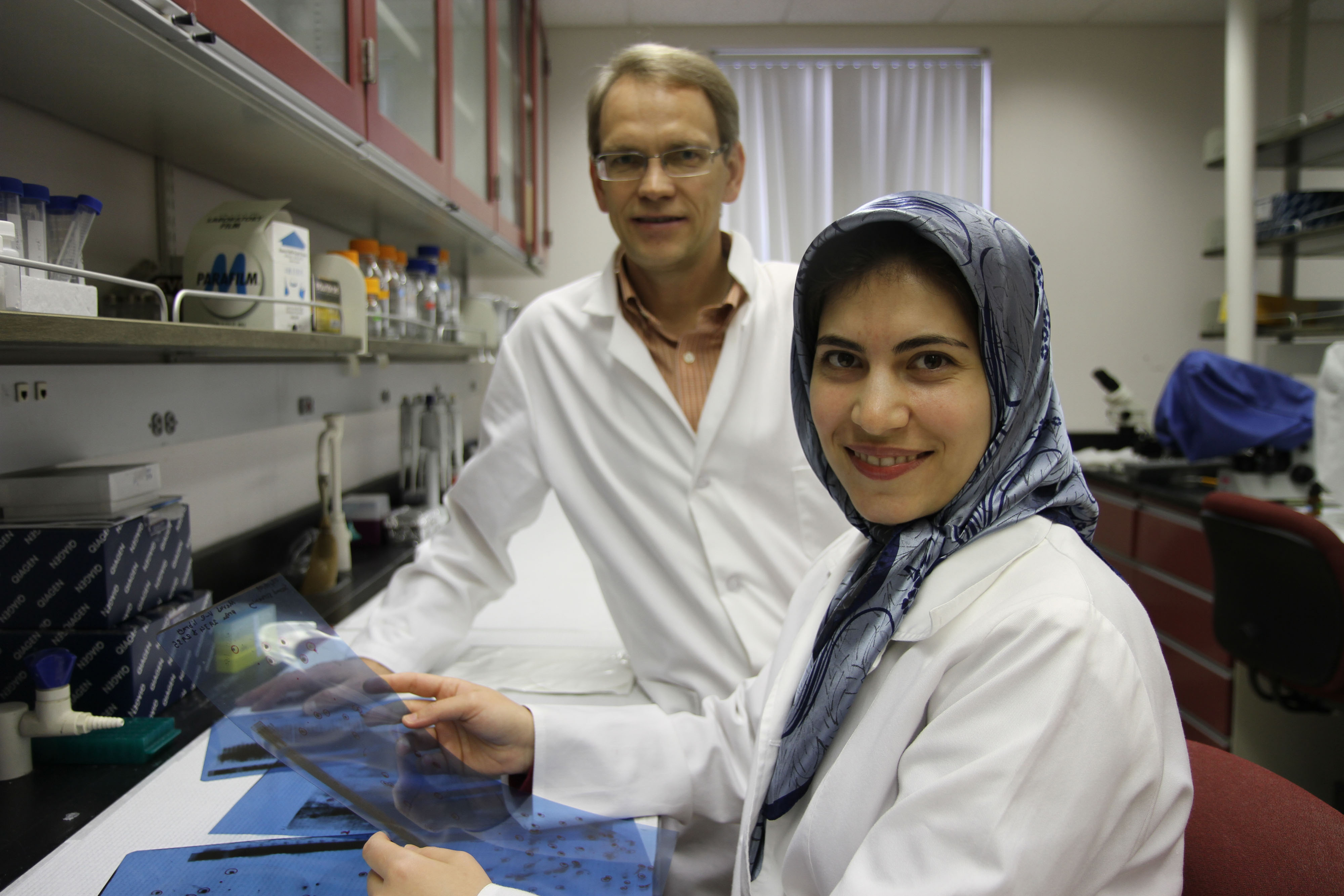Mosquito genetics may offer clues to malaria control, Virginia Tech researchers say

An African mosquito species with a deadly capacity to transmit malaria has a perplexing evolutionary history, according to a discovery by researchers at the Fralin Life Science Institute at Virginia Tech.
Closely related African mosquito species originated the ability to transmit human malaria multiple times during their recent evolution, according to a study published Oct. 4, 2012, in PLoS Pathogens by Igor Sharakhov, an associate professor of entomology in the College of Agriculture and Life Sciences, and Maryam Kamali of Tehran, Iran, a Ph.D. student in the department of entomology. The discovery could have implications for malaria control by enabling researchers to detect and target specific genetic changes associated with the capacity to transmit a parasite.
Malaria causes as many as 907,000 deaths each year, mostly among children in sub-Saharan Africa. Anopheles mosquitoes, which bite mainly between dusk and dawn, transmit human malaria by spreading Plasmodium parasites that multiply in the human liver and infect red blood cells. But of the more than 400 species of mosquito belonging to the Anopheles genus, only about 20 are effective vectors of human malaria, according to the World Health Organization.
The most dangerous of these is the Anopheles gambiae mosquito species, one of seven in the Anopheles gambiae complex, which was thought to have recently evolved the ability to transmit malaria. However, Virginia Tech scientists’ discoveries suggest that this species is actually genetically linked to an older, ancestral lineage.
Scientists used chromosomal analysis to compare gene arrangements for mosquitoes both inside and outside the Anopheles gambiae family to trace the evolutionary connections.
"The outside species served as a reference group for understanding the evolutionary relationship among Anopheles gambiae mosquitoes," Kamali said. "Our goal was to determine how different species arose in the Anopheles gambiae complex, as they all look identical, but have different behaviors and capacities to transmit human malaria."
When resolving the Anopheles gambiae evolutionary history, the scientists identified breaks in DNA that lead to new chromosomal arrangements, and used these rearrangements to demonstrate the repeated evolution of the ability to transmit a parasite, in a back-and-forth fashion.
"This curious stop-and-go flexibility could help us to better understand the nature of the mosquito's capacity to transmit malaria, and calls into question what is driving the genetic flexibility," Sharakhov said.
The discovery is innovative in the field of genetics research.
"The surprising aspect of the paper is the proposal of an ancestral and relatively ancient 2La polymorphism which arose in a hypothetical ancestor and has been maintained in Anopheles gambiae ever since," said Nora Besansky, the Rev. John Cardinal O’Hara C.S.C. professor of biological sciences at the University of Notre Dame, who was not involved in this study. "If confirmed, this would certainly lend novel insight into the evolutionary dynamics of chromosomal inversions in general, not only in mosquitoes."
Ai Xia, a former Ph.D. student of Sharakhov, and Zhijian Tu, professor of biochemistry in the College of Agriculture and Life Sciences, are co-authors on the paper. Kamali is the recipient of numerous awards and scholarships, including the Department of Entomology’s Scholarship for Outstanding Achievement in Systematic Entomology, the College of Agriculture and Life Sciences’ Cyrus McCormick Scholarship, and the 2008-2009 Fralin Life Science Institute Graduate Assistantship.
The Fralin Life Science Institute strategically invests in targeted research areas within the life sciences. Such investments include recruitment and set-up support for new faculty members, retention and recognition of established faculty members, seed funds for new research projects, equipment purchases, graduate student recruitment and support, undergraduate research support, and support for outreach activities. Research initiatives within the life sciences receiving the highest priority for support include vector-borne disease, infectious disease, plant sciences, ecology and organismal biology, obesity, and cancer biology. The Fralin Life Science Institute is also actively engaged in cooperative partnerships with colleges, departments, and other institutes that support the life science community.




